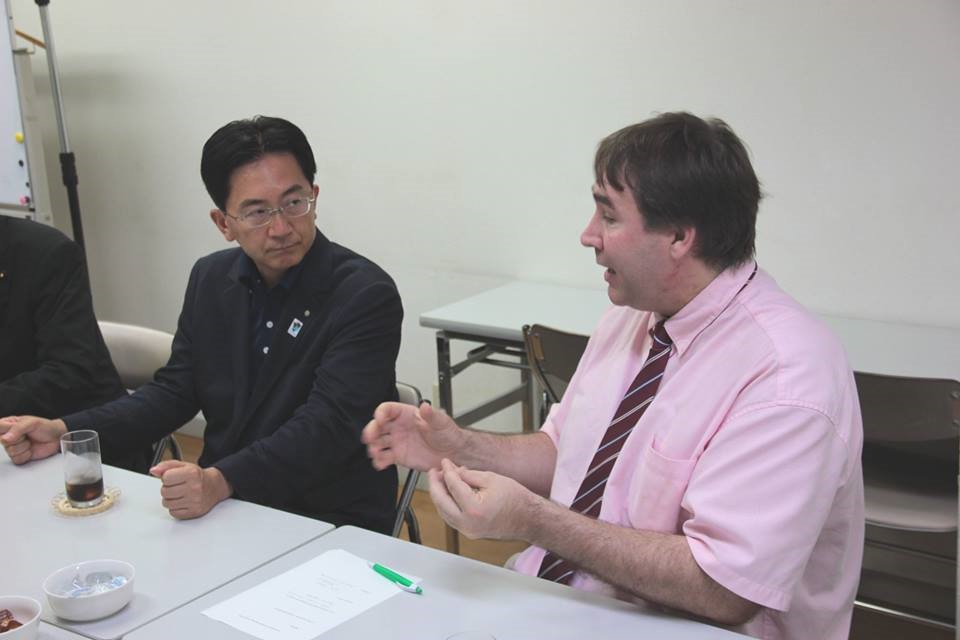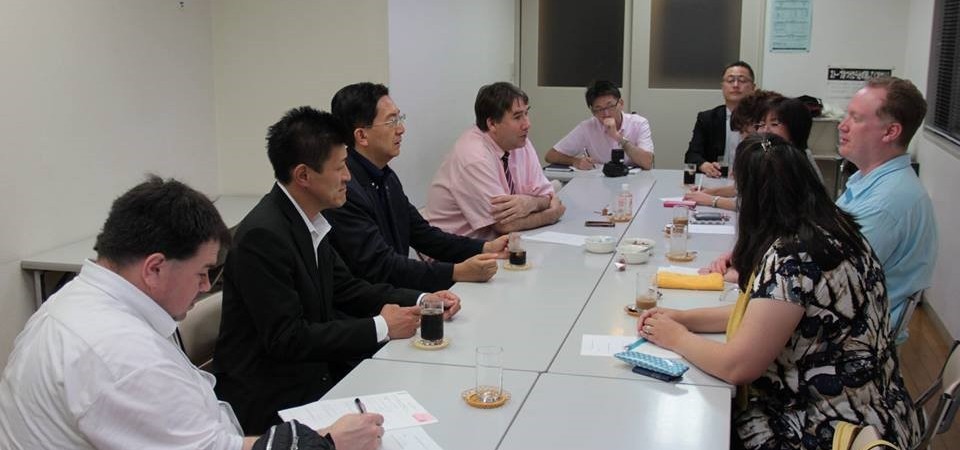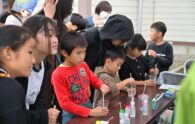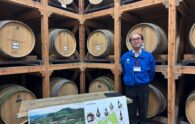On the evening of July 18th, 2015 the ILC Support Committee convened for an impromptu gathering to meet and discuss issues with the prefectural Governor of Iwate the honorable Gov. Takuya Tasso, and Oshu City’s representative in the Prefectural Assembly, Assemblyman Hiroshi Gokon.
Neither of those esteemed gentleman is a complete stranger to the committee. Assemblyman Gokon is probably our largest political benefactor, and we have met with him on repeated occasions, both formally and informally. Additionally, the Committee met with the governor in 2013 to submit a list of suggestions on “internationalizing” Iwate.
That meeting with the governor was a great photo opportunity and put our Committee on the map, but was too short to really discuss our suggestions with Governor Tasso. So when some time cleared up on the calendar of his visit to Oshu, we jumped at the opportunity to hash over some of those points in depth.
Even if we had three hours with the governor we would not have been able to fully cover what needs to be expressed about our lives as foreigners here. With a little over a half hour, we knew we had to hustle to hit upon the main points. First and foremost, we decided that addressing English education was of paramount importance and would tie into many other ILC challenges. The governor seemed most interested in the declining birthrate in Japan, and the concurrent population migration away from rural areas and towards more urban settings and jobs. We tried to emphasize that “internationalizing” Iwate in preparation for the ILC will create a younger generation that will be better able to cope with the presence of an influx of resident foreigners, both in employment and societal settings.

The author with the Governor
We also read him a letter from Oshu City ILC Internationalization Coordinator Anna Thomas, who was not able to attend due to prior commitments. Her suggestions were succinct, to the point, and should be easily put into action. They are as follows:
1) Raise awareness of the recently enacted multilingual call center for stores and tourist facilities. It exists, but needs much more publicity.
2) Bus and train companies should have the names of stations, stops, etc. in Roman letters, with perhaps some prefectural financial support for this undertaking.
3) Encourage municipalities to hand out multilingual information sheets to new residents instructing them where they can get information and help.
These suggestions were well-received by both the committee and the politicians present.
Of course, conscientious advising about life in Japan as a foreign resident will have to include bringing up topics that are somewhat unpleasant. We brought up two points:
First, there was a report of a hotel in southern Iwate that refused foreign customers citing “inability to communicate in Japanese” as the reason. Refusing foreigners is a rare occurrence among Iwate businesses, but this does highlight the need to develop more comprehensive communication strategies. Communication is a two-way street; ideally, tourism facilities would be able to use simple English, Chinese, and Korean with their customers, and resident foreigners would be able to use Japanese to live their daily lives. Language classes and seminars for both sides do exist, but need to be grown in scale.
Another issue is the subject of the occasional police stop of foreign residents for I.D. verification purposes, which can be quite a stressful event. Recently a practicing Muslim member of the committee was stopped and questioned. The police do have a job to do, but additional training is necessary to communicate with foreign residents. As Iwate is preparing to triple its foreign population, these types of incidents must be made known to those in charge. The good news was that the governor and assemblyman seemed to take this information well and responded in kind as best they could.
All in all, the meeting seemed to go well. We really didn’t know what to expect, but looking at the big picture, I think it was productive for both the politicians and the committee. They now have some concrete suggestions about where to put their efforts, and we have strengthened our ties with the prefecture. We made it clear to the governor that we are here and willing to take part in the construction of Iwate’s future in any way. Assemblyman Gokon seemed genuinely pleased by how the meeting went.
What happens next? One possibility that was discussed after the meeting was the committee leading a large- scale ILC informational symposium for resident foreigners, which seems like a good place to start.
The ILC Support Committee
The ILC Support Committee is a group of volunteer foreign residents who are helping local governments create a more international Tohoku. Learn more by checking out our Facebook page.
Chairman
Bill Lewis
Vice-chair
Perly Endo
Supported by
The Oshu International Relations Association
Japanese
知事と議員とのミーティングについて2015年7月18日に、ILCサポート委員会が岩手県知事とごうこん県議員と一緒に、岩手の国際化やILCの誘致について話し合いを行いました。貴重な時間を無駄にしないよう、様々な提案を用意し、この場をもって知事に発表しました。英語教育やグローバル人材育成の重要性を強調し、国際化だけでなく少子高齢化や人口流出の対策のカギになるのではないかということを知事に発表しました。
また、①県内観光施設のための多言語コールセンターをPRすること、②バス停や駅の名前のローマ字化、③市町村役場での多言語情報提供などのアイデアを提案しました。最後に、外国人の宿泊を拒む宿泊施設や警察による身分証明書のチェックなど、外国人が抱えている生活問題を打ち上げました。
知事もごうこん議員も、ILCサポート委員会の提案を真剣に聞いていただき、有意義な機会となりました。これからは、サポート委員会として外国人住民向けのILCセミナー・シンポジウムの企画を考えたいと思います。



